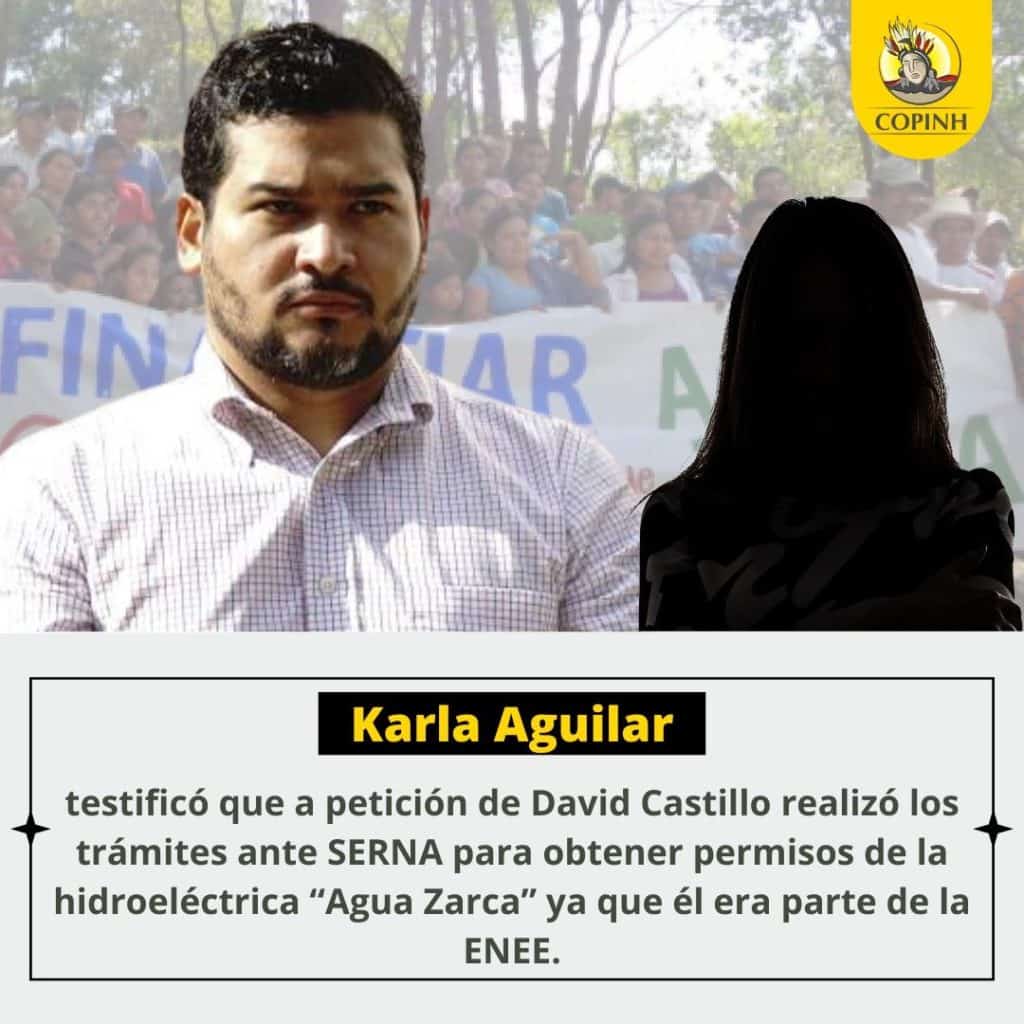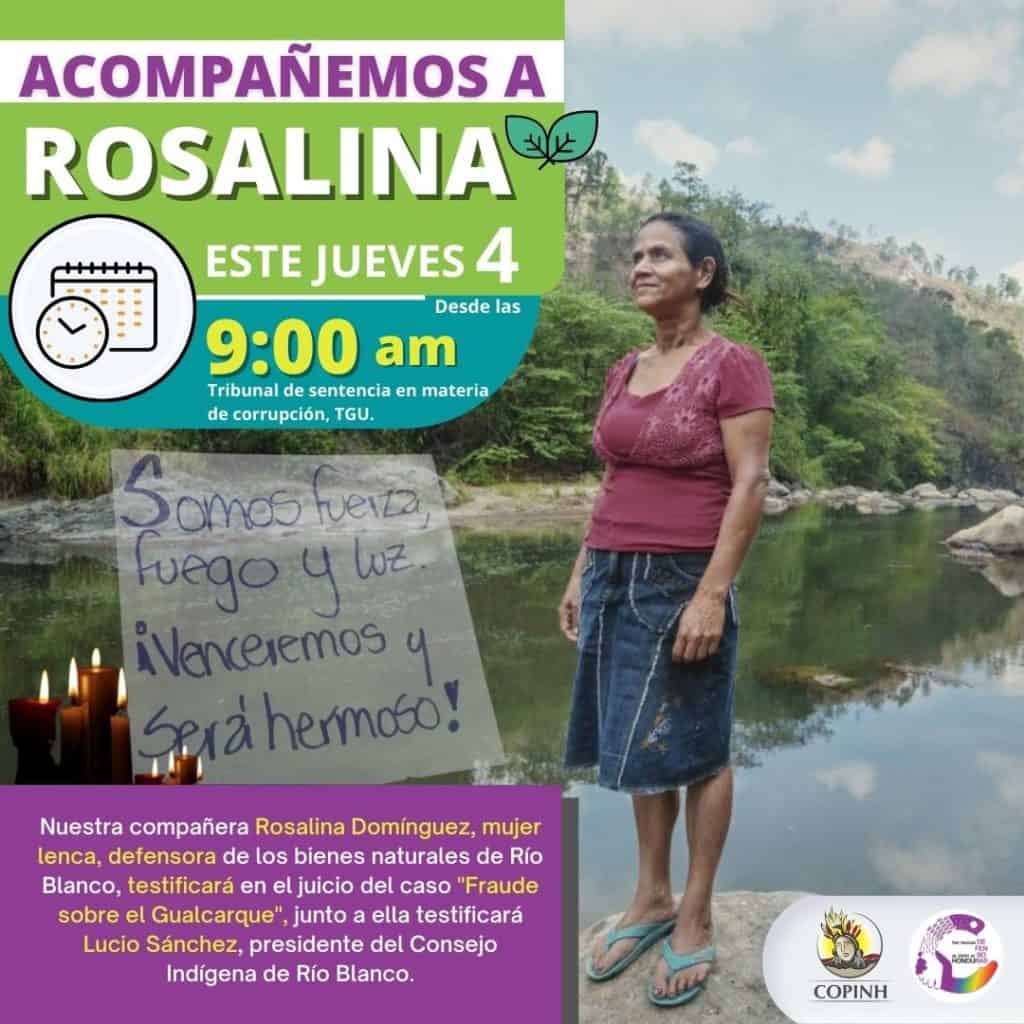Case Overview
This case is part of the “Berta Cáceres case”. The details of the case demonstrates the corruption (fraud, forging public documents, etc) involved in getting the Agua Zarca hydroelectric dam approved on the Gualcarque river, including the manner that the company building the dam, DESA was created, and how the energy contracts with the National Electrical Energy Company (ENEE) and the environmental licenses and permits for the project were obtained. Six individuals are standing trial for their involvement in corruption, including David Castillo, who is currently serving a 20+ sentence for Berta Cáceres’ murder. Berta Cáceres, COPINH, and the community of Rio Blanco, opposed the Agua Zarca dam and the state violated the indigenous community’s right to free, prior, and informed consent.
NOTE: These summaries are based on partial observation by author (Karen Spring) and by summaries posted by the Civic Council of Popular and Indigenous Organizations (COPINH). The trial is hard to follow because the evidence is very technical, the space inside the courtroom is too small for members of the public to attend, and the online broadcasts are difficult to follow.
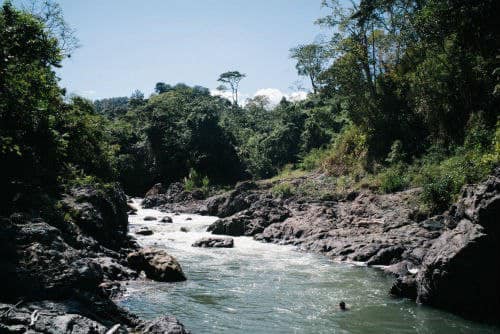
Day One (July 25, 2022)
- The trial began at approximately 10 am. During the first few hours, human rights observers were not permitted inside the small courtroom that is inadequate for a trial with six accused, each represented by at least one defense attorney. The first few hours were also not made available online to the public
- Without public observation, the judge sanctioned attorneys Ritza Antúnez and Juan Carlos Sánchez, the defense team representing David Castillo, for violating the court’s code of conduct. The attorneys requested to change the date of a previous hearing and misrepresented their reasons for doing so. The sanction is valued at two monthly minimum wages.
- David Castillo’s defense attorney Sánchez requested that the judge not allow human rights organizations into the trial claiming that they misinform about the legal process.
- The trial was rescheduled for Wednesday, July 27 at 2:00 pm because attorney Héctor Durán representing two of the accused, Luis Eduardo Espinoza Mejía and José Mario Carbajal Flores, did not attend the trial because of a medical issue.
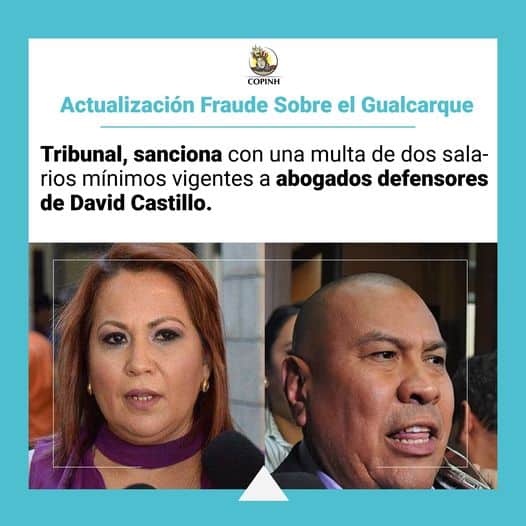
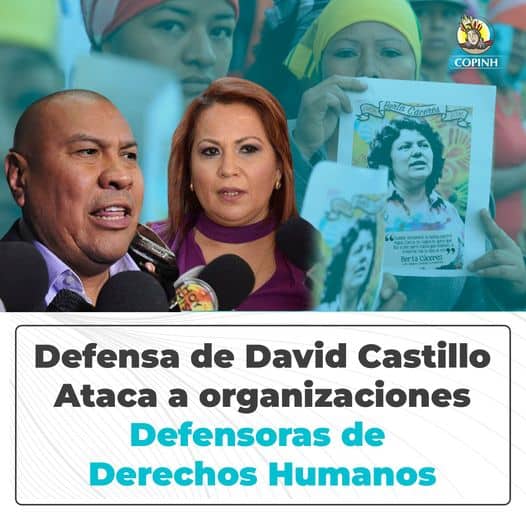
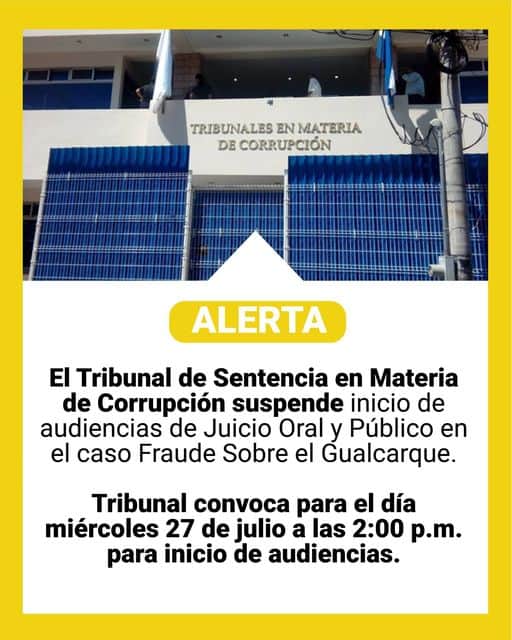
The above images are from COPINH’s Facebook page. From left to right, they read:
Facebook post: “The Corruption Sentencing court sanctions David Castillo’s defense attorneys with a fine of two minimum wages. This is because they did not abide by the code of conduct when lying in relation to a previous request to re-schedule [a hearing].”
Facebook post: “David Castillo’s defense attacks human rights organizations that are observing the Fraud on the Gualcarque case. They claim that the organizations are not affiliated with the case and “misrepresent the information” and request that they are expelled from the hearings, ignoring the work that human rights guarantors like OACNUDH conduct.”
Facebook post: “The Corruption Sentencing court suspends the beginning of the public trial in the Fraud on the Gualcarque case.” This is due to the absence of Héctor Durán, the defense attorney for technicians [accused] Luis Eduardo Espinoza Mejía and José Mario Carbajal Flores due to a medical concern. The judiciary must guarantee the rights of the victims – COPINH and the indigenous council – to a fair, transparent, and public trial. The court convenes the trial for Wednesday, July 27 at 2:00 pm”
Day Two and Day Three
Day 2 was rescheduled bc of medical issue with one attorney
Day 3: Pre-trial evidence & motions were presented. Court to rule on Day 4 (on August 2nd) what evidence is accepted & then, the formal charges will be read and the trial period will begin.
Day Four (August 2, 2022): Court Rules on Evidence Presented & Opening Statements Begin
- Court doesn’t accept documents presented as evidence by attorneys representing COPINH & Rio Blanco community. They include: A credit agreement b/w DESA & international banks, and a financial document written by Rixi Moncada, the former head of National Electrical Energy Company (ENEE). COPINH reports that both documents outline the amount of money obtained in the fraudulent energy contracts & the profits that the criminal group expected to earn through the irregular approval of the Agua Zarca contract, licenses, and permits.
- Today, the prosecutor formalized the charges against the 6 accused in her opening remarks for following crimes:
- 1. David Castillo: Use of fraudulent public documents & fraud.
- 2. Roberto Martinez Lozano: 2 crimes of violation of public functions & fraud
- 3. Carolina Castillo Argueta: Fraud
- 4. Jose Mario Carbajal Flores: 3 crimes of violation of public functions & fraud
- 5. Luis Eduardo Espinoza Mejía: 3 crimes of violations of public functions & fraud
- 6. Raul Pineda Pineda: Falsification of public docs & usurpation of public functions
All of the accused were either public officials that worked in the ENEE or the Ministry of Natural Resources (SERNA). Pineda Pineda was the mayor of San Francisco de Ojüera where the project was set to be constructed. And the two Castillos (not related) were part of DESA.
Together, these size individuals were part of a criminal network of public officials & interested actors that worked to favor a group of wealthy business representatives to illegally & in a corrupt manner, push forward the Agua Zarca project in Rio Blanco
Day Five (August 3, 2022): Witness Testimony Begins
Today, the court began to hear & evaluate large amounts of evidence in the case. Today, the court heard three witness testimonies from:
- Roberto Abate Ponce, a former driver/employee of the company DIGICOM, which was owned by David Castillo. Ponce testified that Castillo used his name, without permission, to create DESA. Later, the Atalas would become shareholders. At the time, Castillo was a public official inside the National Electrical Energy Company (ENEE) and had inside information and access to officials that could approve an energy contract for DESA (hence him hiding his involvement with DESA)
- Karla Aguilar testified that she carried out a series of procedures to obtain the environmental license & permits for the Agua Zarca dam project in the Ministry of Natural Resources. She did so at the request of David Castillo, who was behind DESA with a particular interest in getting such permits, but also was a public official.
- Jorge Romero Santos, an expert at the governmental National Conservation Institute (ICF), testified that studies carried out by himself & DESA, showed that the Agua Zarca dam was not viable and was damaging to the local environment. Romero Santos also testified that the river did not have capacity to produce the amount of electricity proposed. Overestimating energy production is a way that companies/individuals commit fraud against the state because they get paid more than what they can actually produce. It’s also another explanation as to why the National Electrical Energy Company (ENEE) is in such a dire economic situation.
Tomorrow, two Lenca leaders from Rio Blanco will testify. They include Rosalina Domínguez, environmental & land defender from Rio Blanco; & Lucio Sánchez, President of the Rio Blanco Indigenous Council
